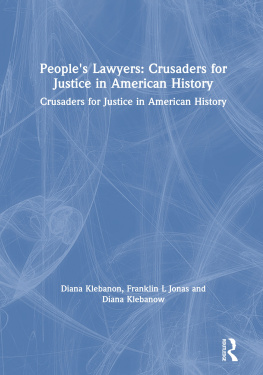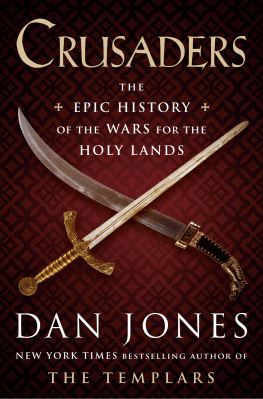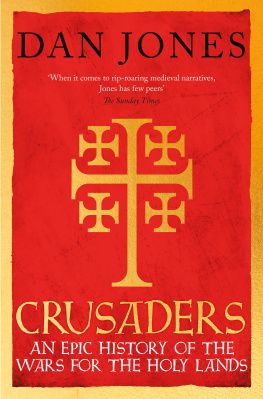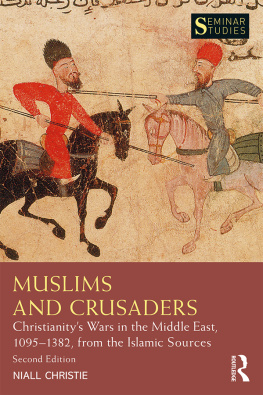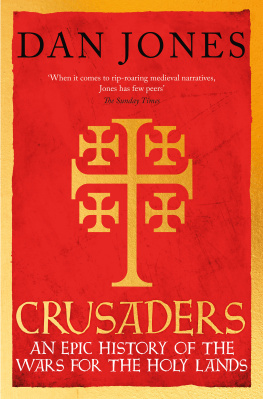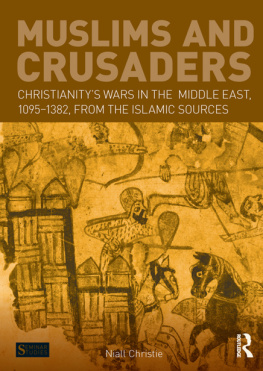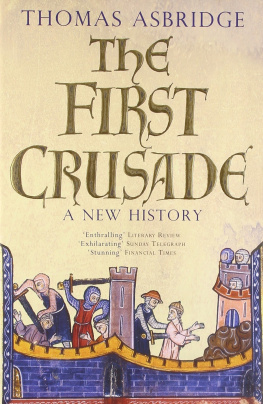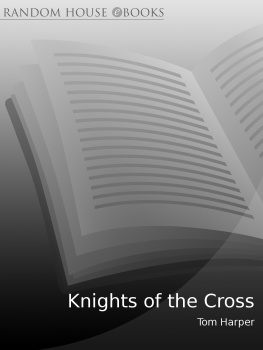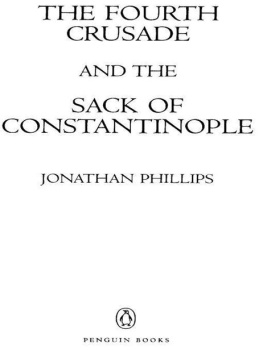Acknowledgments
In 1999, while attending a professional conference, I presented what I expected to be the first of three or four papers concerning the First Crusade. With luck, I hoped to turn these papers into a professional article. Twelve years later, I am finally able to publish this book, the first major contribution in an ongoing research project to which I would like to devote still more years. It has been, and remains, a long and rewarding journey. While undertaking it, I have benefited from the advice, friendship, and support of more people and institutions than I can possibly remember. But I will make a go of it here.
The serious work behind this book began thanks to the American Council of Learned Societies (ACLS), which in the academic year 20022003 enabled me to undertake research in and around Paris devoted to the First Crusade. I had very definite ideas about the crusade at this timeamong them, that the First Crusade had almost nothing to do with the Apocalypse. Things changed. If I had not had this year to explore the literature and the manuscripts, this book would not have been possible.
In 20062007 I was fortunate enough to receive an ACLS Burkhardt Fellowship, which enabled me to spend a year at the American Academy in Rome, now with very different ideas about the crusade. The administrators of the American Academy, in particular the director at the time, Carmela Franklin, were incredibly supportive. The fellows of the Academy proved to be a welcoming and engaging community, whose questions, ideas, and enthusiasm for my research enriched this book immeasurably.
In the following year, 20072008, I returned to Paris, this time through the support of a fellowship from the National Endowment for the Humanities, where the first full version of this book began to take shape.
Without the support of these agencies (not to mention the generosity of my employer, the Department of History at the University of Tennessee, which allowed me to begin my career in Knoxville with a two-year leave), this book would certainly not have been possible. During the early months of my second year in Paris, I received a fellowship from the John D. and Catherine T. MacArthur Foundation. It has opened up whole new opportunities for research and writing, making it possible for me now to think of this book as the first chapter in a larger research project on the impact of the crusade movement in Europe.
In immediate connection with this book, I must thank my agent, Deborah Grosvenor, who guided my manuscript toward Basic Books and who has given me so much invaluable advice along the way. Lara Heimert at Basic Books strongly encouraged me to take the narrative approach in this book, retelling the events of the First Crusade through the prism of apocalyptic theory, and all of the editors and readers at Basic Books have done marvelous work turning a dense and difficult text into a far more accessible and effective story. Hats off especially to Brandon Proia, Melissa Veronesi, and Jan Kristiansson.
Will Fontanez and the University of Tennessee Cartographic Services Laboratory created this books beautiful and beautifully clear maps, working well from my generally muddled requests and instruction. The UT History Department, the Marco Institute for Medieval Studies, and the UT Office of Research through the UT Exhibit, Performance, and Publication Expense Fund, generously contributed subventions to support the production of those maps as well as to pay for the many other illustrations that have enriched Armies of Heaven.
My colleagues and friends in medieval history have contributed enormously to this book in so many waysthrough advice, through references, through reading and critiquing the many incarnations of its chapters, and through writing letters of support as I applied for a variety of different grants (many more than the ones listed here). I cannot imagine how I must have tried the patience of Sally Vaughn, Ed Peters, Sharon Farmer, Tim Graham, Philippe Buc, Jason Glenn, and Geoff Koziol. But they always came through with reference letters for me without fail. The people who wrote letters of endorsement for the MacArthur Fellowship were anonymous. I thank all of you, and I hope this book does not entirely disappoint.
The scholars who have given advice and encouragement are more numerous still. Thanks so much, in no particular order, to Dennis McCarthy, Helen Damico, Kevin Uhalde, Christopher MacEvitt, Peggy Brown, Bill North, Victoria Morse, Marina Rustow, Jerry Passannante, Tom Burman, Nick Paul, Clementine Oliver, Brett Whalen, Matthew Gabriele, Tom Madden, Mark Pegg, Benedicta Ward, Cecelia Gaposchkin, Dominique Barthlemy, Frdrique Lachaud, John Ott, Maura Lafferty, Jean-Charles Bdague, Richard Landes, and Karin Fuchs. A number of crusade scholars, whom I have either met only through e-mail or only in passing at academic conferences, have generously given advice, including Jonathan Riley-Smith, Marcus Bull, Jean Flori, John France, Nikolas Jaspert, and Luigi Russo. Finally, I thank all of the graduate and undergraduate students with whom I have been fortune enough to have worked, many of whom have suffered through my crusade class. In this category, at the University of Tennessee, I have to thank especially Meghan Worth and Geoff Martin. This list is woefully incomplete. To everyone else, please accept my apologies and gratitude.
My friends have borne patiently with this project as well. Many of them, who like me are part of the medieval history game, have been mentioned. Others who dont fall into that category (Tom Bissell, who traveled to Jerusalem with me in 2007; Joseph McAlhany, who traveled around Bohemonds homeland with me that same year; my parents, Gene and Marilyn Rubenstein; and John Randolph and Gary Barth, Chad Brumley and Steve Barrick, who are the best friends a person could ask for) have made equally important contributions.
On the same day that I began putting the final touches on this manuscript, two very good friends passed away. Tom Sizgorich taught me a lot about religious violence during the one year I was fortunate enough to walk the same hallways as he at the University of New Mexico. His contribution to the study of history was already extraordinary. The loss to the field at his early passing is incalculable; the loss to his friends is beyond expression.
Jim Powell also will not be able to see this book, in many ways the product of his encouragement. During the 19981999 academic year, when I was teaching at Syracuse, Jim treated me to many lunches, allowed me to raid his library, taught me so much about the crusades, and assured me that my small papers were saying something interesting about this well-worn historical topic of crusading. His friendship and support meant the world to me, and I will miss him sorely.
During the research and writing of this book, as is now apparent, I attended many conferences and spoke to many audiences. Most memorably, in the spring of 2008 I traveled from Paris to New York to participate in a conference at Fordham University. While there I went out to dinner with a magazine editor named Meredith McGroarty. About a year later, we were married. Because of her love and support, by the time I finished this book, I was a much happier person than I had been at the beginninga transformation that enlivens even the darkest passages of this book. Because of her sharp advice and her editors eye, Armies of Heaven tells a much better story than it would have done without her.
This book is for Meredith.
Abbreviations
Please note that in instances where both a Latin text and an English translation are listed here, it is always the Latin version that is cited in the text of this book. English translations are provided to enable curious nonspecialist readers to consult source material. Citations are made according to book and chapter, and in the case of Fulcher, sentences, as well as by page. Book and chapter citations should enable readers to locate the cited material quickly, whatever edition or printing or translation they are working from. Sources that are cited within a single chapter appear in full in the notes.


